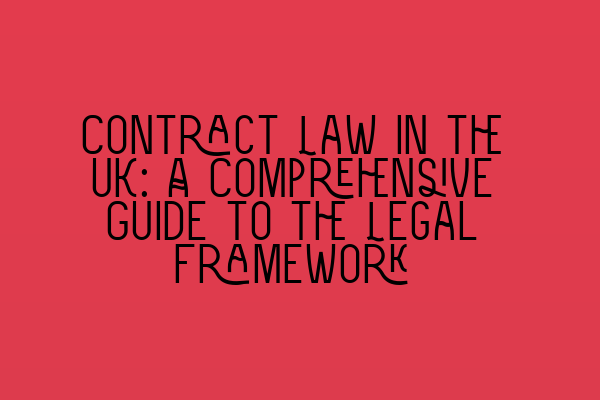Contract Law in the UK: A Comprehensive Guide to the Legal Framework
Welcome to our comprehensive guide to contract law in the UK. In this article, we will discuss the fundamental principles of contract law, how contracts are formed, the essential elements of a contract, and the legal remedies available in case of a breach. Whether you are a law student preparing for the SRA SQE exams or a legal professional seeking a refresher, this guide aims to provide you with a clear understanding of the legal framework surrounding contracts.
What is a Contract?
A contract is a legally binding agreement between two or more parties. It establishes the rights and obligations of the parties involved and provides a framework for their interactions. Contracts exist in various forms, such as written, verbal, or even implied by the conduct of the parties.
Understanding the key elements of a contract is crucial for determining its enforceability. The essential elements of a contract include:
- Offer: An offer is a proposal made by one party to another, indicating a willingness to enter into a contract on specific terms.
- Acceptance: Acceptance occurs when the offeree agrees to the terms of the offer, creating a binding contract between the parties.
- Consideration: Consideration refers to something of value exchanged between the parties, such as money, goods, or services. It is a vital element that distinguishes a contract from a mere gift.
- Intention to create legal relations: For a contract to be enforceable, the parties must demonstrate an intention to enter into legal relations. Certain agreements, such as social or domestic arrangements, may lack this intention.
- Capacity: The parties entering into a contract must have the legal capacity to do so. For example, minors and individuals lacking mental capacity may be unable to enter into binding contracts.
- Consent: Consent refers to the free and genuine agreement of the parties involved. Contracts entered into under duress, fraud, or undue influence may be voidable.
- Legality: Lastly, the purpose of the contract must be legal. Agreements to carry out illegal activities or against public policy are considered void.
These elements, together, establish a valid and enforceable contract under UK law.
Contract Formation
Contracts can be formed in various ways, and it is essential to understand the different methods of contract formation:
Express Contracts:
An express contract is formed when the parties explicitly state their agreement, either orally or in writing. Written contracts provide the advantage of clarity and are the preferred method for more complex agreements.
Implied Contracts:
Implied contracts are not expressly stated but rather inferred from the conduct or actions of the parties involved. These contracts are typically based on the presumed intention of the parties and are legally binding, just like express contracts.
Quasi-Contracts:
Quasi-contracts are not true contracts in the traditional sense since they do not arise from a mutual agreement between the parties. Instead, the law imposes certain obligations on one party to prevent unjust enrichment. For example, if you accidentally pay someone twice for a service, the law may require the recipient to reimburse you.
Legal Remedies for Breach of Contract
Contracts are designed to protect the expectations and rights of the parties involved. However, in some cases, one party may fail to fulfill its obligations, resulting in a breach of contract. In such situations, several legal remedies are available:
- Damages: Damages are a monetary award intended to compensate the non-breaching party for any losses suffered as a result of the breach. There are various types of damages, including expectation damages, reliance damages, and consequential damages.
- Specific Performance: In certain cases, a court may order the breaching party to fulfill its contractual obligations instead of awarding damages. This remedy is commonly used in contracts involving unique items or services.
- Rescission: Rescission refers to the cancellation of the contract, returning both parties to their pre-contractual positions. This remedy is typically available when a contract was entered into based on fraud, mistake, or misrepresentation.
- Injunctions: An injunction is a court order that prohibits a party from taking certain actions or compels them to perform specific actions. It is commonly used to prevent irreparable harm or to enforce specific terms of a contract.
Each case is unique, and the appropriate legal remedy depends on the specific circumstances of the breach.
Conclusion
Contract law is a fundamental aspect of the legal framework in the UK. Understanding the essential elements of a contract, the methods of contract formation, and the available legal remedies in case of a breach are vital for any legal professional or law student. We hope this comprehensive guide has provided you with a solid foundation to navigate the complex world of contract law.
For further preparation resources, such as SQE 1 practice exam questions and SQE 2 preparation courses, visit our related articles:
- SQE 1 Practice Exam Questions
- SQE 1 Practice Mocks FLK1 FLK2
- SQE 2 Preparation Courses
- SQE 1 Preparation Courses
- SRA SQE Exam Dates
Good luck with your legal studies and future endeavors!
